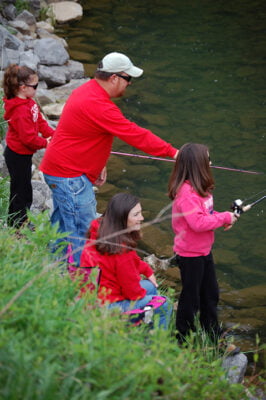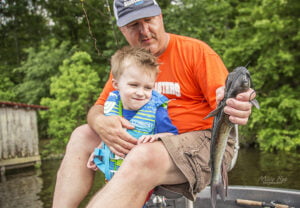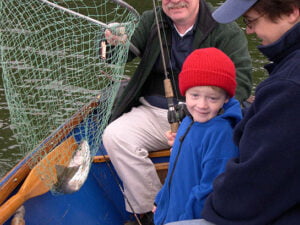 Some of my best memories as a kid are fishing with my dad. One thing I can say is that we never really discussed fishing safety or what to do in an emergency. Times were different and we didn’t worry about it.
Some of my best memories as a kid are fishing with my dad. One thing I can say is that we never really discussed fishing safety or what to do in an emergency. Times were different and we didn’t worry about it.
Today, while it seems like we worry about everything, it’s for a good reason. It’s important that we teach our children how to behave properly in a boat and the necessary steps needed to keep them safe on the water.
This guide should help you not only take actionable steps for their well-being, but help you have a conversation with them about fishing safety.
Communicate Your Expectations
As adults, we may not realize that drowning is the leading cause of death in children ages 1-4. It even accounts for more than nine percent of the global mortality rate according to https://insmoothwaters.com/statistics/drowning/.
It’s our responsibility to have an honest and firm conversation with our kids about the importance of fishing safety. Our goal is not to scare them or make them worry. Instead, we want them to understand how important it is to take safety seriously and how it can make a huge difference in the overall experience.
 What I like to do with my kids is put a spin on it. They don’t often care about their own safety, but if I tell them they’re doing something to “keep daddy safe” they tend to listen more.
What I like to do with my kids is put a spin on it. They don’t often care about their own safety, but if I tell them they’re doing something to “keep daddy safe” they tend to listen more.
Have a pre-fishing checklist that outlines all the behaviors we’ll have once we get in the boat:
1. We don’t jump in the boat
2. We always pay attention to where our hook is
3. We let each other know if we’re going to stand up
4. We don’t cast near each other
5. We keep the boat clean and neat
6. We NEVER reach over the side of the boat
Once you go through the checklist, you can say that these things will keep daddy (or mommy) safe.
Use Personal Flotation Devices
 As I mentioned, years ago we didn’t pay much attention to these details but PFDs are so important today, especially with children. They’re much more comfortable, less bulky, and made with softer material so they won’t aggravate your kids if they have to wear them all day.
As I mentioned, years ago we didn’t pay much attention to these details but PFDs are so important today, especially with children. They’re much more comfortable, less bulky, and made with softer material so they won’t aggravate your kids if they have to wear them all day.
Frankly, I recommend you wear one as well. In the event that something goes wrong, you can’t help your child if you’re not helping yourself first. There are even inflatable life jackets now that will inflate with the pull of a string so they’re less cumbersome on your body.
Stay Neat and Organized
This tip was part of our checklist and it’s very important. A neat boat is a safe boat. Make sure your line is coiled up, supply lines on your baitwell aren’t leaking, and that you have all the necessary lures nearby.
Teaching your children as young as possible how to handle lures, where to put them, and how to be safe with them is critically important. They need to know how to properly cast, respect distance between the two of you, and where not to cast. All of these factors will keep the boat organized and free from panic.
Train Them on Land
I can’t express this tip enough because it’s something that a lot of parents say they know but then they forget to do it because of the excitement. If you’re taking your kid out on a boat for the first time, you need to train them in the boat, on land.
Get in the boat, set everything up as if you’re going on a trip, and pretend for a little while. Teach them where to cast if you’re casted out, how to rig the line, how to behave in the boat, what to do if they lose something overboard, and so on.
One of the biggest mistakes that cause a child to fall in the water is reaching for something they dropped. If your child drops a drink, toy, or piece of tackle in the water, make sure they never reach for it without your help. Grab their shirt or PFD while they reach into the water so you can pull them back if they start to slip.
Children should learn how to handle these types of situations so you can let them get it themselves. Just make sure they’re safe.
Training your kid on proper etiquette is important and essential for safety as well. Make sure they understand not to cast over your line, to watch out for hang-ups like trees and stumps, and how to handle the fish when you hook it.
The News Is Your Friend
While this might not apply to your kids, it’s important for you to pay attention to the weather. Anticipating things like rain, thunderstorms, or heavy wind will be important to your child’s safety on the water.
Rain can make the boat more slippery than it already is causing a fall. Heavy wind also makes fishing more challenging for kids because of the impact it has on casting. Wind can cause hang-ups and potential injury from hooks flying all over the place.
Make sure when you’re training your kids you pick the best weather scenarios to start them off in. As they get more experience you can start to introduce them to rainy day fishing and night fishing.
Have an Action Plan
Most importantly, you need to have a plan. Make sure you understand what to do if your kid falls in the water, if you’re faced with an engine breakdown, or if your child suffers an injury in the boat.
It helps to have additional equipment like a first aid kit, something to illuminate the boat, and a cell phone. Ensure that someone is aware that you are out fishing so they can call emergency assistance if you’re not home at a reasonable time.
Fishing safety might not be a fun and glamorous topic to discuss with your kids but it’s an important part of raising them to be responsible anglers themselves. As an adult, I’m very thankful that my dad introduced me to this topic and your kids will thank you someday as well.
Author: Coty Perry – Yourbassguy.com
Coty is a third-generation angler with more than two decades of experience fishing the murky and muddy waters of Northeast PA. He’s written for dozens of fishing publications and loves sharing his knowledge with the readers.

